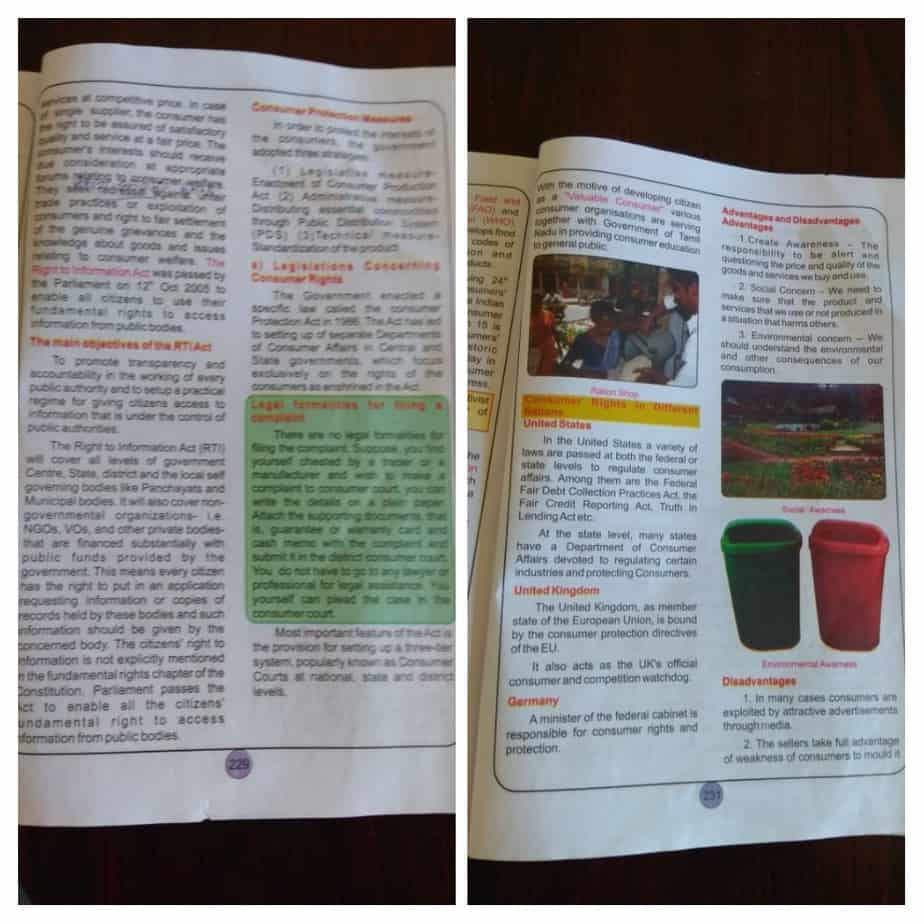Children these days are active shoppers, both online and offline, but are we doing enough to make our youth aware of their rights as consumers? It does not appear so. The subject of consumer rights is given scant regard and any structured education on this subject is usually confined to students of commerce at the higher secondary school and college levels. In fact, a lesson on consumer protection for students of Class 10 has now been deleted, following a revision of syllabus in Tamil Nadu.
“The lesson on the rights and responsibilities of consumers in civics was an essential guide for students. Sensitised thus, a lot of students made it a habit to check expiry dates and MRP of the products purchased. Unfortunately, the revised syllabus this year did not include the subject,” said T Vanarosa who is working as a Senior Principal in a private school.
Students too say that it had imparted significant learning. “Impacted by the lesson, I started watching videos about online frauds. On many occasions, I stopped my parents and relatives from falling into the trap of consumer scams,” said Amudha N, a student of Class 11.
The deleted lesson on consumer rights covered vital topics such as state consumer commission, legal formalities for filing a complaint and legislation concerning consumer rights.
Consumer Clubs: A ray of hope ?
While the Tamil Nadu education department evidently does not consider education on consumer rights important for school students, Chennai has a strong chain of consumer clubs in the colleges, affiliated to the Civil Supplies and Consumer Protection department. Launched in 2002, this central government scheme aims at spreading knowledge of consumer rights and markets among the student population. The centre also issues a grant of Rs 10,000 per consumer club.
Members of such clubs conduct awareness sessions, rallies and street plays to sensitise the general public about consumer rights. “We conduct at least two programmes a month, the most recent one being a sensitisation session on food safety for government school students in Pattabiram. It is the need of the hour because a majority of students do not know even the basics, such as the need to check the expiry date of a product,” said C Balaji, coordinator of Citizen Consumer Club at DRBCCC Hindu College, Avadi. The 12-year-old club has 50 students as members.
Dr K Valli, assistant professor at CTTE Women’s college who is also part of the institution’s consumer club explains their objectives:
- As it is practically not feasible to monitor all sellers, creating awareness among consumers becomes critical
- Students are sensitised about duplicate brands and adulteration in consumer clubs
- They are taken on trips to consumer courts to give them a glimpse of the legal proceedings
- They are also asked to gather information of cases involving relatives and friends, which are taken up for open-ended discussions.
- Clubs collaborate with consumer organisations to conduct lectures, competitions and many such activities. Important days such as National Consumer Rights Day (December 24) and World Consumer Rights Day (March 15) are observed.
Tamil Nadu is the only state in the country that has kept alive the activities of consumer clubs, said a senior official with the Civil Supplies department.
Things going downhill
However, the clubs in schools have been a failure. “Most schools are marks-driven. Students from Classes 10 to 12 should be encouraged to be a part of these clubs, but since the focus is on their board exams, these clubs are inactive in a lot of schools,” said T Sadagopan, President, Tamil Nadu Progressive Consumer Centre.
Over the past five years, the functionality of the clubs has further deteriorated due to non-receipt of funds from the central government, say consumer experts and officials from the Civil Supplies department. “Each club was given a sum of Rs 5000 every two years to help meet the expenses of the projects and seminars. All of it is history now. I don’t remember the last time we received the funds,” said a Principal of a private (self-financed) college, seeking anonymity.
The Principal’s statement is echoed by consumer experts. “A lot of colleges are meeting the expenses of the clubs by collecting a meagre amount from the students. Many schools are conducting nominal awareness sessions only, so that the clubs remain active and are not closed,” said M Somasundaram, liaison officer at the Consumer Association of India.
But why did the situation change? The official from the Civil Supplies department throws some light. “Consumer Clubs are a dead concept in the country, except in Tamil Nadu. It is also the reason why the central government is not interested and has stopped disbursing the funds. We have used funds from state government to support the performing consumer clubs,” said the official.
The deletion of consumer rights as a topic from the school curriculum on one hand, and deficiency of funds to run consumer clubs in the colleges on the other, certainly do not augur well for the awareness of consumer rights among the youth of the city.
